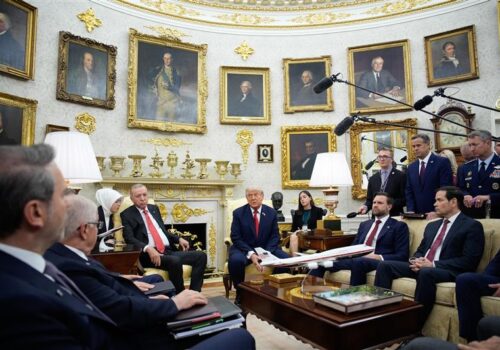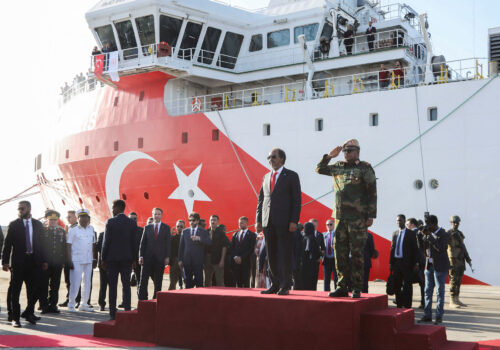Why Ankara’s rising power in the Sahel could benefit the West
Bottom lines up front
- Arms and infrastructure deals have steadily bolstered Turkey’s standing as a reliable partner in the Sahel, where coups disrupted French and US roles.
- Turkey’s “solution-based” diplomacy contrasts sharply with Russia’s security-first playbook in Africa, yet they operate in parallel rather than competing in the countries with military juntas.
- Ankara must decide whether to align more openly with Russia in the Sahel or mediate and potentially counter Russian influence, potentially coordinating with the West on security strategy.
As the US role in the Sahel is weakening, Turkey’s role is rising. With new defense agreements, increasing diplomatic engagements, and joint economic development projects with new, junta governments that espouse anti-colonial rhetoric in Burkina Faso, Mali, and Niger, Turkey finds itself working in the same theater as the Kremlin to fill the void left after Western forces departed. Turkey’s new trusted status among Sahelian governments and its state-led approach make it one of the nations positioned to influence regional security dynamics during a time when other Western powers are constrained. Although Turkish efforts in the Sahel have been primarily based on its own strategic ambitions and national interests, Ankara’s growing influence offers a rare channel through which the United States and its allies could recalibrate their approaches to the region.
The Sahel’s break with the West
Since these coups and the establishment of military juntas in Mali, Niger, and Burkina Faso, France and the United States have faced the annulment of defense agreements in the region, French and US troops have withdrawn from the region, the European Union’s Takuba Force ceased anti-Jihadist operations in Mali, and, in January, Niger revoked a counterterrorism accord with the United States, demanding the withdrawal of 1,000 US troops from the country. The United States has laws that prohibit it from assisting governments that have overthrown democratic governments, including clear guidance from the US State Department against foreign assistance to Niger, and now Washington finds itself without a clear role in the Sahel.
The region’s Western-backed security architecture has collapsed: Three withdrawals (i.e., Mali, Burkina Faso, and Niger) prompted the dissolution of the Group of Five (G5) for the Sahel. The same three departures from the Economic Community of West African States (ECOWAS) has left the Sahel searching for new patrons and new strategic frameworks. Mali, Burkina Faso, and Niger, for example, have formed the Alliance of Sahel States (AES), a political and defense bloc that rejects old alignments. To fill the new defense void, alternative partners without the baggage of colonial legacy—most notably Russia and Turkey—have stepped in, offering defense cooperation without the governance conditions demanded by the West.
The United States, which provided humanitarian aid, economic investment, and security forces to the region for roughly a decade prior to the coups, lost much of its ability to advance regional security interests when it was pushed out of the region. Its ability to monitor threats in the region and in neighboring countries like Libya, coordinate strategies with local forces, and access crucial intelligence was significantly degraded. Although US security operations in the region have been constrained by new partnerships, it still has options. Opportunities remain through indirect engagement—particularly with actors that retain both credibility on the ground and diplomatic standing in the West. Turkey is one of the only powers operating in the Sahel that meets both criteria.
Turkey’s role amid a shrinking Western presence, rising Russian influence
Turkey’s military cooperation in the Sahel draws on nearly two decades of experience positioning itself as a rising power in Africa, rooted in its 2003 Strategic Depth doctrine and early initiatives like the “Strategy for the Development of Economic Relations with Africa” and the “year of Africa” in 2005—the same year it secured observer status in the African Union. Initially, Turkey relied on soft power, leveraging shared Ottoman heritage, cultural diplomacy, and economic partnerships to expand its influence. However, what began as a soft-power push—through development aid, cultural ties, and embassy openings—has evolved into a defense and infrastructure strategy, especially under President Recep Tayyip Erdoğan’s aim to position Turkey as a leader among emerging powers. Turkish delegations have conducted regular visits to AES capitals, striking arms and infrastructure deals while pursuing bilateral military agreements.
At the same time, Russia, too, has made swift inroads. It is capitalizing on anti-colonial sentiment and offering support through its largest private military company, the Wagner Group, to provide “training, close protection, and counter-terrorism operations.” Through proxy forces, Russia has gained access to political influence and resource extraction in exchange for security-force training, arms deals, and protection of junta leaders. Russia’s use of proxy forces has allowed it to distance itself from Russian casualties and military failures.
However, Russia’s war in Ukraine has slowed its operations in the Sahel. Across AES, Russian forces are stretched thin. Despite Russia’s success in stabilizing the Touadéra regime in the Central African Republic in 2021—a conflict that gave Russia defense legitimacy despite the fact that Sahel—Russian forces have largely been unsuccessful. In 2024, fifty-one percent of global terrorism-related deaths took place in the Sahel. This was the deadliest year in the Sahel’s history as the region remains mired in conflict and plagued by violent insurgencies, fragile state institutions, and waning international engagement.
In the Sahel, Turkey can play the same role as Russia. Turkey can offer Sahelian militaries affordable, “rapidly deployable” equipment. And Russia, which has been struggling to keep up with military-industrial demands, is an increasingly unreliable partner. Sahelian clients grew more discontented with the Russian proxy forces’ unsuccessful operations and inability to fulfill weapons contracts, and the Wagner Group officially left Mali, announcing on Telegram that its mission was accomplished. In its place, Russia plans to consolidate its troops under the Russian Ministry of Defense-backed Africa Corps. Reestablishing connections, building trust, and establishing higher capacity supply lines will take time; meanwhile, alternative partners like Turkey are in place in the Sahel and can take advantage of the Kremlin’s declining foreign-operations capacity.
In contrast to Russia’s focus on mercenary deployments and direct-combat missions, Turkey offers a more varied tool kit: combining diplomacy, state-to-state defense deals, economic engagement, intelligence sharing, and technology transfers. Turkey’s defense industry, particularly its drone sector, made early moves into the African market, supplying low-cost, high-capability platforms like Baykar’s Bayraktar TB2 and Akinci drones. These have become cornerstones of AES air power, and are often more cost-effective than systems from Iran, Israel, or even Russia.
Turkey is now the main producer of combat drones for Africa, according to the Africa Center for Strategic Studies (part of the US Department of Defense). In December 2024 Mali received Turkish Akinci drones in addition to its eight TB2 drones; Niger has purchased six TB2 drones, five Karayel-SU drones, and Aksungur drones; and Burkina Faso has purchased at least six TB2s and two Turkish Akinci drones. These drones are managed and operated out of local airbases, like the Niamey air base in Niger or the Bamako Air Base 101 in Mali, and are managed by a “hyper-closed circle” of high-ranking officials. In early April 2025, Mali was also found to be using MAM-T bombs 20 kilometers from its border with Algeria when a Turkish-made Akinci drone was shot down. This was the first time the Malian armed forces were found to be using MAM-T bombs, which are guided, high-explosive fragmentation munitions that can be strapped to Bayrak drones, and are manufactured by Turkish company Roketsan.
On the ground, Turkey’s engagement increasingly makes up for declining Russian power. Turkish drones and, reportedly, Turkish-hired Syrian mercenaries disrupt insurgent operations in areas where state forces are absent, helping to alleviate local manpower shortages. Although unconfirmed, Sadat, a private Turkish military contractor often referred to as Erdogan’s “parallel army,” was alleged to have sent more than one thousand Turkish-trained Syrian mercenaries to Niger and Burkina Faso in 2024, tasked with protecting mines, petroleum infrastructure, and military installations. This is not the first time Sadat has been accused of using Syrian mercenaries in foreign conflicts.
Already, Turkey has increased intelligence-sharing capabilities in the region through its intelligence agency, Milli İstihbarat Teşkilatı, which recently opened a hub in Niger. Its growing network of embassies, companies, and security personnel across the Sahel gives Ankara access to critical information, which can influence security operations.
Turkey’s economic expansion in the Sahel
Turkey has slowly expanded its influence in the Sahel by expanding its security operations simultaneously with its commercial agreements.
While the AES has implicitly distanced itself from former colonial powers through new security partnerships and arms contracts, the three states are also turning to alternative partners for economic support. They had perceived prior Western economic conditions as unfair and are seeking more beneficial economic relationships. After revoking mining licenses and pulling out of economic partnerships with the West, the Sahel now needs new partners to help develop its potentially lucrative energy and raw materials sectors.
Since the 2010s, Turkey has increasingly engaged with Africa’s energy sector, leveraging its 2017 National Energy and Mining Policy to enhance its energy independence. It has signed agreements with at least seventeen African countries across North, West, and East Africa, as well as the Horn of Africa, focusing on renewables and critical minerals. Trade volumes between Turkey and Africa increased from $5.4 billion in 2003 to $40.7 billion in 2022, and a growing number of Turkish companies are expanding their operations in Africa.
Turkey now has greater reason to diversify its imports away from Russia and Iran— given the disruption of trade patterns by conflicts in Ukraine, the Mediterranean, and the Middle East—and toward Africa. The Sahel’s underdeveloped energy sector offers Turkey a foothold in new supply routes and economic opportunities.
A Turkish energy company has taken a leading role in Mali, supplying 60 megawatts of power and building a heavy fuel oil power plant. Turkish exports to Mali rose from $87 million in 2021 to $111 million in 2023. Similarly, Turkey has boosted trade with Burkina Faso, despite regulatory hurdles in the mining sector. Exports rose from less than $100 million prior to 2020 to $166 million in 2024, reflecting Ankara’s deeper economic engagement with the new military government.
In the Sahel region, Niger has traditionally been Turkey’s strongest energy partner in the region. Turkey and Niger have signed bilateral mining agreements and oil and natural gas agreements, established a working committee to expand economic cooperation, and held leadership-level discussions about infrastructure development projects in northern Niger. Turkish firms have been uniquely willing to engage in high-volatility regions, implementing critical infrastructure, energy, and mining projects simultaneously with increased defense cooperation.
The Sahel’s mineral wealth is critical to Turkey’s industrial ambitions and plans to become a processing hub for critical minerals. Turkey’s defense industry depends heavily on critical minerals used in advanced weaponry, aerospace systems, and batteries and, at the same time, Turkey’s rising clean technology industry has accelerated the need for lithium, nickel, copper, and other raw minerals. While Turkey is beginning to build up its raw mineral processing capabilities in an attempt to limit foreign control over critical supply chains, Ankara is in search of suppliers for these materials.
With limited domestic reserves and rising industrial needs, Ankara is targeting the region’s large supplies of raw materials. Mali is Africa’s second-largest lithium producer; Niger is a leading exporter of uranium; and Burkina Faso is a major gold supplier. Though Turkey has domestic reserves of tungsten, graphite, and cobalt, access to the Sahel’s minerals enables Turkey to compete in global markets and develop its own processing base.
Through diplomatic and corporate efforts, Turkey has tried to secure access to gold and uranium in Niger, the world’s seventh-largest producer of uranium; Turkish and Azerbaijani companies have discussed joint mining projects in the Sahel; and, until recently, a Turkish company held the industrial exploitation rights of the largest gold mine and the largest manganese mine in Burkina Faso. Russian companies have likewise expanded their economic presence in the Sahel; Russian companies have signed lithium mining deals with Mali, lithium and uranium mining deals with Niger, and deals on nuclear cooperation with Burkina Faso. While Western companies have been sidelined, governments in the Sahel remain open to cooperation with both Ankara and Moscow. Turkey, as a NATO ally that retains the political space to operate in these markets, is a potential counterbalance to Russia’s growing influence while advancing its own strategic and industrial objectives.
Solution-based diplomacy in a security-first landscape
What sets Turkey apart from other external actors—especially Russia—is the diversity of its engagement. Unlike Moscow’s arms-for-access model, which is often viewed as exploitative and destabilizing, Ankara has prioritized a multifaceted approach that includes trade, infrastructure, defense, diplomacy, and development. Turkish-African trade spans sectors from textiles to healthcare and energy, and Turkey’s public and private sectors have actively invested in education and capacity building across the continent. This “solution-based” diplomacy contrasts sharply with Russia’s security-first playbook.
Yet Turkey’s growing presence in contested regions comes with risks. Infrastructure investments in unstable political environments require security guarantees—and that often means greater military involvement. As Ankara deepens its footprint, it must decide whether to align more openly with Russia, or to use its position to mediate and potentially counter Russian influence.
Turkey is viewed by many African leaders as a reliable, noncolonial partner. This gives Ankara access that Western powers now lack. While Turkey has not publicly aligned with US or European policy in the Sahel, its access and credibility in the region offer an opportunity to bridge the growing gap between Western interests and Sahelian realities.
If Ankara chooses to leverage this position, it could quietly support Western objectives—sharing intelligence, coordinating security policies, or shaping development strategies that undercut Russian influence. Turkey would not be acting as a Western proxy, but as a sovereign actor leveraging its credibility and access to serve both its own interests and those of the broader international order. In a region where Western engagement is rapidly shrinking, Turkey’s role may become indispensable—not as a rival, but as a crucial partner.
Not a proxy but a pathway: The West’s reentry point in the Sahel
The power balance between Russia and Turkey is markedly different from conflict zones where they stood or stand on opposite sides—such as Syria, Libya, Ukraine, and the Azerbaijan-Armenia conflict. In the Sahel, both powers are engaging the same postcoup regimes—Russia through mercenary-led counterinsurgency and Turkey through state-led arms deals, drone operations, and economic development. They are not in direct confrontation in the Sahel, nor are they locked in zero-sum competition. Instead, they operate in parallel, often in the same theaters and with the same governments, but with divergent methods, capabilities, and long-term goals.
Parallel engagement between Russia and Turkey raises security concerns for Western powers who have lost their influence in the region, but it also creates a unique opening. While Russian security forces have been largely unsuccessful in their efforts to mitigate threats in the Sahel, Turkey has an opportunity to increase its engagement with local forces. And as the only Western partner force that is directly engaging with the region, Ankara can potentially disrupt Russian influence and coordinate with the West on security strategy. Its access to critical mineral assets, defense infrastructure, and high-level political relationships across the AES bloc can offer the West indirect access to a region from which it has been largely expelled.
Since President Donald Trump returned to office at the beginning of 2025, both Washington and Ankara have shown renewed willingness to deepen their bilateral partnership on regional matters and cooperate in third countries, most notably Syria. In addition to diplomacy, including Foreign Minister Hakan Fidan and Secretary of State Marco Rubio meeting in Washington and Brussels, both capitals have continued demonstrating top-level cooperation on Syria with the trilateral gathering in Riyadh, where Trump and Erdoğan met with Syrian President Ahmed al-Sharaa, together with the creation of the joint Syria Working Group to further enhance closer cooperation on Syria’s reconstruction and stability efforts. This dynamism and strategic alignment can be a strong foundation for extending the US-Turkey partnership into Africa, where shared interests in stability and security could help reshape the dynamics of great-power competition in the region.
Turkey’s pragmatic foreign policy is not without complications. But in the Sahel, that very pragmatism can work to the West’s advantage. If Washington moves beyond its reflexive skepticism and recognizes Turkey’s intermediary potential, the Sahel could shift from a symbol of Western retreat to a frontier of renewed influence—anchored by a partner that understands and navigates both the streets of Niamey and the corridors of NATO.
About the authors
Alp Burak Ozen is a program assistant at the Atlantic Council Turkey Program.
Haley Nelson is a Boren Scholar and a Georgetown University alumna. She is an independent geopolitical consultant with a focus on energy and infrastructure security in Eastern Europe, Central Asia, and Turkey.
related content
explore the program

The Atlantic Council Turkey Program aims to promote and strengthen transatlantic engagement with the region by providing a high-level forum and pursuing programming to address the most important issues on energy, economics, security, and defense.
Image: Military personnel operate during the BAMEX'25 Defense Expo, in Bamako, Mali, November 11, 2025. REUTERS/Francis Kokoroko


